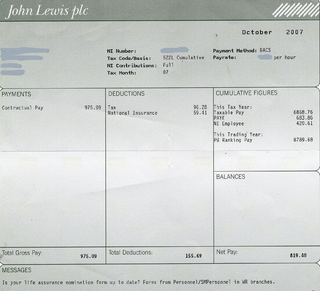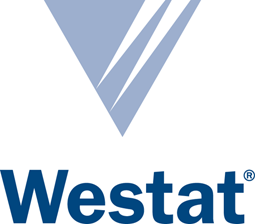
The United States Department of Labor (DOL) is one of the executive departments of the U.S. federal government. It is responsible for the administration of federal laws governing occupational safety and health, wage and hour standards, unemployment benefits, reemployment services, and occasionally, economic statistics. It is headed by the secretary of labor, who reports directly to the president of the United States and is a member of the president's Cabinet.

The Bureau of Labor Statistics (BLS) is a unit of the United States Department of Labor. It is the principal fact-finding agency for the U.S. government in the broad field of labor economics and statistics and serves as a principal agency of the U.S. Federal Statistical System. The BLS collects, processes, analyzes, and disseminates essential statistical data to the American public, the U.S. Congress, other Federal agencies, State and local governments, business, and labor representatives. The BLS also serves as a statistical resource to the United States Department of Labor, and conducts research measuring the income levels families need to maintain a satisfactory quality of life.

A wage is payment made by an employer to an employee for work done in a specific period of time. Some examples of wage payments include compensatory payments such as minimum wage, prevailing wage, and yearly bonuses, and remunerative payments such as prizes and tip payouts. Wages are part of the expenses that are involved in running a business. It is an obligation to the employee regardless of the profitability of the company.

In economics, a discouraged worker is a person of legal employment age who is not actively seeking employment or who has not found employment after long-term unemployment, but who would prefer to be working. This is usually because an individual has given up looking, hence the term "discouraged".

A payroll is a list of employees of a company who are entitled to receive compensation as well as other work benefits, as well as the amounts that each should obtain. Along with the amounts that each employee should receive for time worked or tasks performed, payroll can also refer to a company's records of payments that were previously made to employees, including salaries and wages, bonuses, and withheld taxes, or the company's department that deals with compensation. A company may handle all aspects of the payroll process in-house or can outsource aspects to a payroll processing company.
A layoff or downsizing is the temporary suspension or permanent termination of employment of an employee or, more commonly, a group of employees for business reasons, such as personnel management or downsizing an organization. Originally, layoff referred exclusively to a temporary interruption in work, or employment but this has evolved to a permanent elimination of a position in both British and US English, requiring the addition of "temporary" to specify the original meaning of the word. A layoff is not to be confused with wrongful termination.
The National Center for Health Statistics (NCHS) is a U.S. government agency that provides statistical information to guide actions and policies to improve the public health of the American people. It is a unit of the Centers for Disease Control and Prevention (CDC) and a principal agency of the U.S. Federal Statistical System. It is headquartered at University Town Center in Hyattsville, Maryland, just outside Washington, D.C.

Employee benefits and benefits in kind, also called fringe benefits, perquisites, or perks, include various types of non-wage compensation provided to employees in addition to their normal wages or salaries. Instances where an employee exchanges (cash) wages for some other form of benefit is generally referred to as a "salary packaging" or "salary exchange" arrangement. In most countries, most kinds of employee benefits are taxable to at least some degree. Examples of these benefits include: housing furnished or not, with or without free utilities; group insurance ; disability income protection; retirement benefits; daycare; tuition reimbursement; sick leave; vacation ; social security; profit sharing; employer student loan contributions; conveyancing; long service leave; domestic help (servants); and other specialized benefits.

A part-time job is a form of employment that carries fewer hours per week than a full-time job. They work in shifts. The shifts are often rotational. Workers are considered to be part-time if they commonly work fewer than 30 hours per week. According to the International Labour Organization, the number of part-time workers has increased from one-quarter to a half in the past 20 years in most developed countries, excluding the United States. There are many reasons for working part-time, including the desire to do so, having one's hours cut back by an employer and being unable to find a full-time job. The International Labour Organisation Convention 175 requires that part-time workers be treated no less favourably than full-time workers.

Westat is an employee-owned professional services corporation located in Rockville, Maryland. It provides research services to government agencies and businesses. The corporation conducts research studies in behavioral health & health policy, clinical trials, education, public health & epidemiology, social policy & economics and transportation.

The employment cost index (ECI) is a quarterly economic series detailing the changes in the costs of labor for businesses in the United States economy. The ECI is prepared by the Bureau of Labor Statistics (BLS), in the U.S. Department of Labor.
Disability Insurance, often called DI or disability income insurance, or income protection, is a form of insurance that insures the beneficiary's earned income against the risk that a disability creates a barrier for completion of core work functions. For example, the worker may be unable to maintain composure in the case of psychological disorders or sustain an injury, illness or condition that causes physical impairment or incapacity to work. DI encompasses paid sick leave, short-term disability benefits (STD), and long-term disability benefits (LTD). The same concept is instantiated in some countries as income protection insurance.
The National Compensation Survey (NCS) is produced by the United States Department of Labor's Bureau of Labor Statistics (BLS), measuring occupational earnings, compensation costs, benefit incidence rates, and plan provisions. It is used to adjust the federal wage schedule for all federal employees. Detailed occupational earnings are available for both metropolitan and non-metropolitan areas, broad geographic regions, and on a national basis. The NCS' Employment Cost Index measures changes in labor costs. The average costs of employee compensation per hour worked is presented in the Employer Costs for Employee Compensation (ECEC).

The Oklahoma Department of Labor (ODOL) is an agency of the government of Oklahoma that is headed by the Oklahoma Labor Commissioner, a statewide elected position. ODOL is responsible for supervising the administration of all state laws relating to labor and workplace safety and gathers and publishes information about the workforce of Oklahoma.
The New York State Department of Labor is the department of the New York state government that enforces labor law and administers unemployment benefits.
Iowa Workforce Development is a government agency in the American state of Iowa, responsible for overseeing workplace safety, workers' compensation, unemployment insurance and job training services. It was formed in May 1996.
In economics, the absence rate is the ratio of workers with absences to total full-time wage and salary employment. In the United States, absences are defined as instances when persons who usually work 35 or more hours per week worked less than 35 hours during the reference week for one of the following reasons: own illness, injury, or medical problems; childcare problems; other family or personal obligations; civic or military duty; and maternity or paternity leave.

The International Labor Comparisons Program (ILC) of the U.S. Bureau of Labor Statistics (BLS) adjusts economic statistics to a common conceptual framework in order to make data comparable across countries. Its data can be used to evaluate the economic performance of one country relative to that of other countries and to assess international competitiveness.

John Maron Abowd is the Associate director for research and methodology and chief scientist of the US Census Bureau, where he serves on leave from his position as the Edmund Ezra Day Professor of Economics, professor of information science, and member of the Department of Statistical Science at Cornell University.

The Wisconsin Department of Workforce Development (DWD) is an agency of the Wisconsin state government responsible for providing services to Wisconsin workers, employers, and job-seekers to meet Wisconsin's workforce needs. To effect its mission, the Department administers unemployment benefits and workers' compensation programs for the state of Wisconsin; ensures compliance with state laws on wages and discrimination; provides job resources, training, and employment assistance for job-seekers; and engages with employers to help them find and maintain adequate staffing for their businesses.










